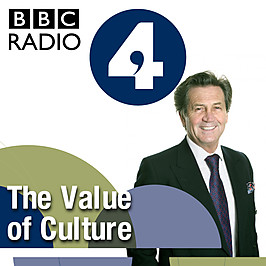Via Open Culture, this is a cool 5-part series on the value of culture, including the power of culture to create change (1), the two cultures debate between science and art (3), the rise of mass culture (4), and the value and meaning of culture today (5) - links to the five available episodes are below.
“The Value of Culture” Revealed in a New BBC Radio Series by Melvyn Bragg
January 8th, 2013
Your presence here indicates that you have an interest in culture. But what, exactly is culture? I’ve long addressed that perhaps too-broad question with a simple working definition: if Melvyn Bragg broadcasts about it, it’s probably culture. You may remember the English writer, presenter, and House of Lords member from our posts on his documentaries on Jackson Pollock and Francis Bacon, or from the mention of his long-running BBC Radio 4 program In Our Time. But while that show certainly has covered scientific topics — evolutionary psychology, genetic mutation, the neutrino — Bragg and his panels of experts spend even more airtime discussing subjects claimed by the humanities. Some of its most interesting moments happen at the crossover, with scientific angles on the humanistic and vice versa; “Goethe and the Science of the Enlightenment” comes to mind, to name but one example. Where conversations like those can arise, I daresay we have culture at its most robust.
But I merely circle around the issue. Bragg’s five-part Radio 4 series The Value of the Culture deals with the question of culture’s nature head-on. Need we call culture anything more specific than the body of things that mankind makes? Does culture work as a force for good? What does culture look like from an anthropological perspective? Must works reach a certain standard, or display certain qualities, to count as culture? What does the gap between the sciences and the humanities mean for culture? How did “mass culture” come about, as opposed to “high culture”? And what does all this say about the culture we have today? Assembling his typically impressive range of luminaries from across the British intellectual landscape, Bragg asks these questions and many more besides, using as a point of departure ninetheenth-century poet, critic, and school inspector Matthew Arnold’s description of culture as “the best which has been thought and said” which provides life its “sweetness and light.” But much has changed in how we regard culture since the nineteenth century, and here we have just the program to get us thinking harder than ever about it.
All episodes of The Value of Culture: Culture and Anarchy (above),Culture and the Anthropologists, Two Cultures, Mass Culture, What’s the Value of Culture Today?
Related content:
~ Colin Marshall hosts and produces Notebook on Cities and Culture and writes essays on literature, film, cities, Asia, and aesthetics. Follow him on Twitter at @colinmarshall.
1. Culture and Anarchy
1/5 Melvyn Bragg explores Matthew Arnold's ideas about culture being a powerful force for good
FIRST BROADCAST: 31 Dec 2012
Listen now
2. Culture and the Anthropologists
2/5 Melvyn Bragg considers the importance of culture to the discipline of anthropology.
FIRST BROADCAST: 01 Jan 2013
Listen now
3. Two Cultures
3/5 Melvyn Bragg looks back at 150 years of dialogue between the arts and sciences.
FIRST BROADCAST: 02 Jan 2013
Listen now
4. Mass Culture
4/5 Melvyn Bragg charts the rise of mass culture in the 20th century.
FIRST BROADCAST: 03 Jan 2013
Listen now
5. What's the Value of Culture Today?
5/5 Melvyn Bragg and his guests debate the meaning and value of culture today.
FIRST BROADCAST: 04 Jan 2013
Listen now

No comments:
Post a Comment